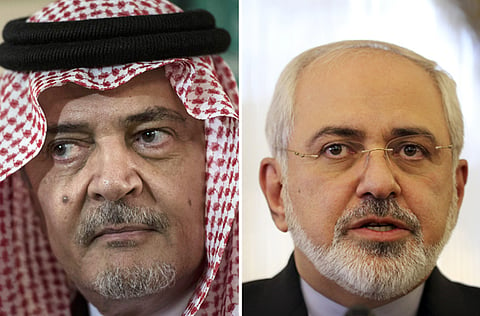Saudi Arabia and Iran: Spring mending fences despite too many differences
Analysts on both sides of the Arabian Gulf agree that relations are on the mend

Dubai: Fresh overtures between Saudi Arabia and Iran come at a time when both Riyadh and Tehran are at loggerheads over Syria’s festering civil war.
While analysts on both sides of the Arabian Gulf have different views on the recent development, they agree on one basic thing: Relations are on the mend. “I believe [Saudi Foreign Minister] Saudi Al Faisal. He won’t go in public and say he has extended an invitation and he didn’t. Nobody does that,” said Saudi writer and researcher Khalid Al Dhakeel. “This is an indication that the relations are on the mend”
Iranian analyst Mohammad Sadeq Hussaini told Gulf News “there is no written invitation from the Saudi foreign ministry to Mohammad Javad Zarif”.
Saudi Arabian and Iranian officials rarely visit each other, but the three former Iranian presidents, Mohammad Khatami, Ali Akbar Hashmi Rafsanjani and Mahmoud Ahmadinejad, each visited Saudi Arabia in the past 15 years.
Last year, after President Hassan Rouhani took office, he spearheaded a conciliatory shift in Iran’s foreign relations, and the most noticeable result, to date, was reaching an interim deal on Tehran’s nuclear programmes with western powers in November.
Iran’s Zarif also embarked on a Gulf tour in December to the UAE, Oman, Qatar and Kuwait. Kuwait has been assisting mediation efforts between Saudi Arabia and Iran, according to the Iranian political expert.
But Hussaini said the mediation efforts have been stuck because of “a deep protocol difference.”
“The Saudis want to put all issues on the table and to raise the level of talks gradually,” he told Gulf News. “The Iranians say relations are not cut to follow such a procedure.”
When asked about the possibility of holding dialogue between the two countries despite their different positions on several issues, Al Dhakeel said, “Even foes hold dialogue and have relations.”
“Dialogue doesn’t mean the end of the problems,” he said. “There are a myriad of problems with Iran, and the main one is that Iran has to stop founding Shiite militias in the region. Other problems can be solved afterwards,” Al Dhakeel said.
Several militias and groups are supported by Iran financially, militarily and politically. They include, apart from the Hezbollah in Lebanon, Al Fadel Bin Abbas Brigades and Righteous Brigades (Assa’eb Ahl Al Haq), which are fighting in Syria.
Hussaini believes Iran’s increasing influence, especially in Iraq and Lebanon, and the survival of the Syrian regime of Bashar Al Assad, which is supported by Iran, could be among the reasons behind better relations between Iran and its Arab neighbours.
“It is true that Iran has achieved gains in Iraq and Lebanon, but you should keep into consideration that these gains are politically temporary,” Al Dhakeel cautioned, adding that Iraq has been in a civil war since 2003, and Iran can’t keep supporting a regime in Syria that “has already finished and lost its regional and international legitimacy.”
Sign up for the Daily Briefing
Get the latest news and updates straight to your inbox


